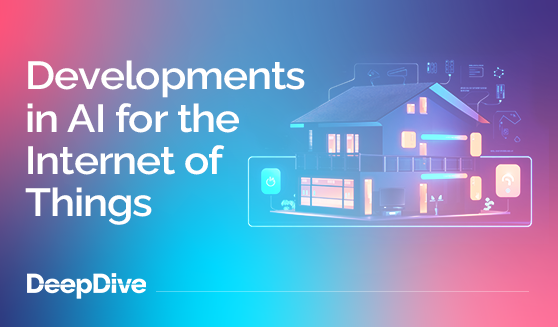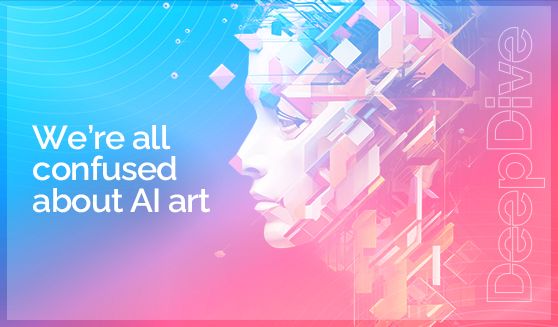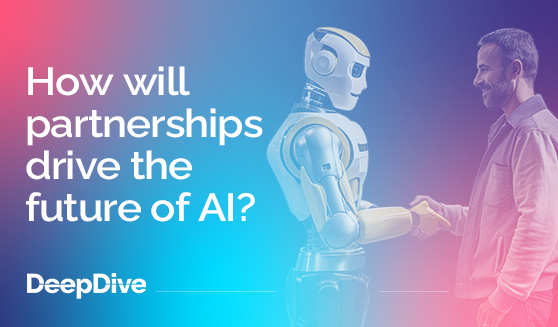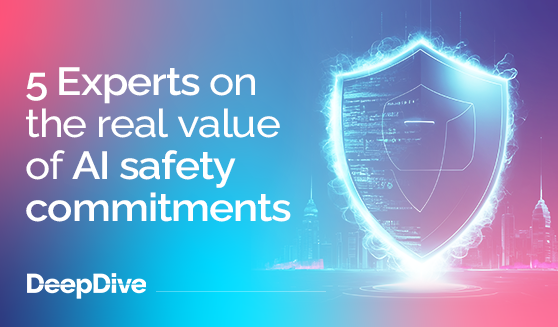
Developments in AI for the internet of things
Edge AI is driving important shifts in the Internet of Things (IoT) landscape by integrating artificial intelligence tech directly into IoT devices (also known as edge devices).


Welcome to the 25 new deep divers who have joined us since last Wednesday. If you haven’t already, subscribe and join our community in receiving weekly AI insights, updates, and interviews with industry experts straight to your feed.
----------------------
Your weekly immersion in AI.
Recently, an artist named Jason Matthew Allen became the focus of a touch of controversy.
A piece of art he created won first prize at the Colorado State Fair last year. But then the US government ruled that the artwork couldn’t be copyrighted.
Why? Can’t all artists protect their intellectual property and retain ownership of their work?
Yes. But Allen didn’t make this artwork on his own – he created it with AI.
The piece, called Théâtre D’opéra Spatial, was created using the generative AI platform Midjourney, which turns text descriptions into images.
(...and we can share it with you without asking the artists’ permission because copyright has not been granted.)
Allen prompted the AI with numerous words and phrases, and estimates that he spent around 80 hours working on it, as reported by the Smithsonian. His initial prompts produced over 900 renderings, from which he chose his three favourites – editing them in Photoshop before entering all three in the competition.
But when he revealed on social media that this winning (and beautiful) piece of work was AI-generated, it went viral – attracting media and legal attention.
The US Copyright Office ruled that AI art cannot be copyrighted.
According to the Smithsonian, Allen said he believes that criticisms of his work are rooted in fear – as artists worry that technology will make them redundant. The Colorado State Fair may change its competition rules, or add a new category specifically for AI-assisted art.
But the situation has raised interesting (and important) questions about AI and intellectual property which can’t be answered by one art prize or one state ruling – along with questions about what art itself really is.
After all, AI artwork may be a composite of images available online – but isn’t all art, in some way, a composite result of the hundreds of years of art that came before it?
There’s a lot of figuring-out to do when it comes to the way AI uses information from data lakes to produce new work.
In 2022, another case in the US was filed by three artists against several generative AI platforms, on the grounds that the AI was using their original works without licence in order to train itself in their art styles – enabling users to generate new artwork that would be highly derivative of those artists’. The case, Andersen v. Stability AI, was later dismissed due to findings that there were flaws in the artists’ argument.
And this year, image licensing platform Getty filed a lawsuit against Stable Diffusion, alleging that the AI was violating copyright and trademark rights in its use of a watermarked photograph collection. The lawsuit has yet to conclude.
The growing number of cases in this area are evidence that legal systems, AI developers, and individual creators are coming up against a new paradigm – and new systems to agree and protect rights will need to develop over time.
As Gil Appel, Juliana Neelbauer, and David A. Schweidel wrote for the Harvard Business Review, developers should ensure they’re in compliance with the existing laws involved licensing and compensating IP owners for use of their work.
But where it’s unclear if and how those laws apply to AI-generated content, confusion and disagreements will continue as we settle into life with AI.
But as Appel, Neelbauer and Schweidel pointed out, it’s not all bad:
“At the same time both creatives and corporate interests have a dramatic opportunity to build portfolios of their works and branded materials, meta-tag them, and train their own generative-AI platforms that can produce authorized, proprietary, (paid-up or royalty-bearing) goods as sources of instant revenue streams.”
If you enjoyed this content and want to learn more about the latest in AI, subscribe to our YouTube channel, where we upload new videos every week featuring leading AI industry experts like Pascal Bornet (Chief Data Officer, Aera Technology), Cassie Kozyrkov (Chief Decision Scientist, Google), Betsy Greytok (Vice President, Ethics amp; Policy, IBM) and more at #DeepFest23. You can also register for DeepFest 2024.

Edge AI is driving important shifts in the Internet of Things (IoT) landscape by integrating artificial intelligence tech directly into IoT devices (also known as edge devices).

Welcome to the 8 new deep divers who joined us since last Wednesday. If you haven’t already, subscribe and join our community in receiving weekly AI insights, updates, and interviews with industry experts straight to your feed. DeepDive Your weekly immersion in AI. You’ve heard it, we’ve

Welcome to the 10 new deep divers who joined us since last Wednesday. If you haven’t already, subscribe and join our community in receiving weekly AI insights, updates, and interviews with industry experts straight to your feed. DeepDive Your weekly immersion in AI. We recently wrote about the new

Edge AI is driving important shifts in the Internet of Things (IoT) landscape by integrating artificial intelligence tech directly into IoT devices (also known as edge devices).

Welcome to the 8 new deep divers who joined us since last Wednesday. If you haven’t already, subscribe and join our community in receiving weekly AI insights, updates, and interviews with industry experts straight to your feed. DeepDive Your weekly immersion in AI. You’ve heard it, we’ve

Welcome to the 10 new deep divers who joined us since last Wednesday. If you haven’t already, subscribe and join our community in receiving weekly AI insights, updates, and interviews with industry experts straight to your feed. DeepDive Your weekly immersion in AI. We recently wrote about the new